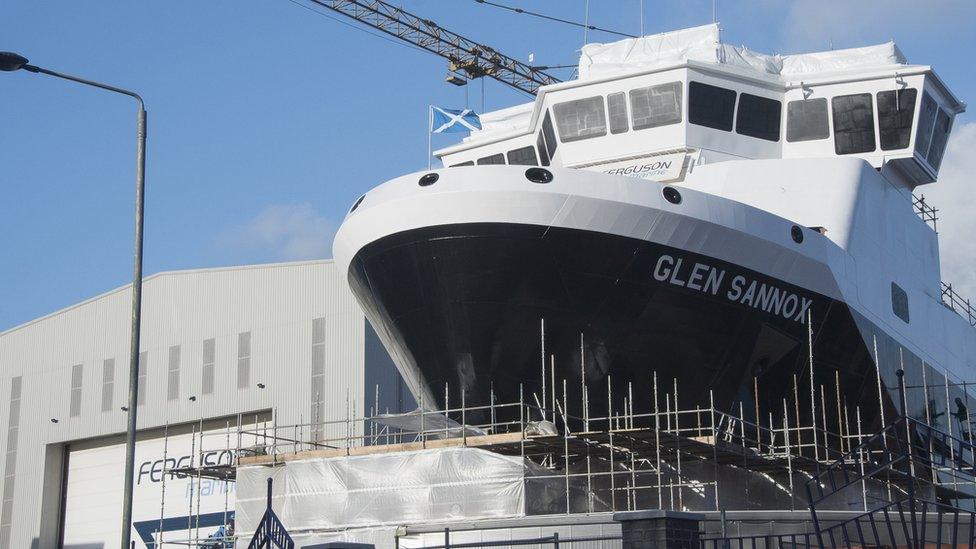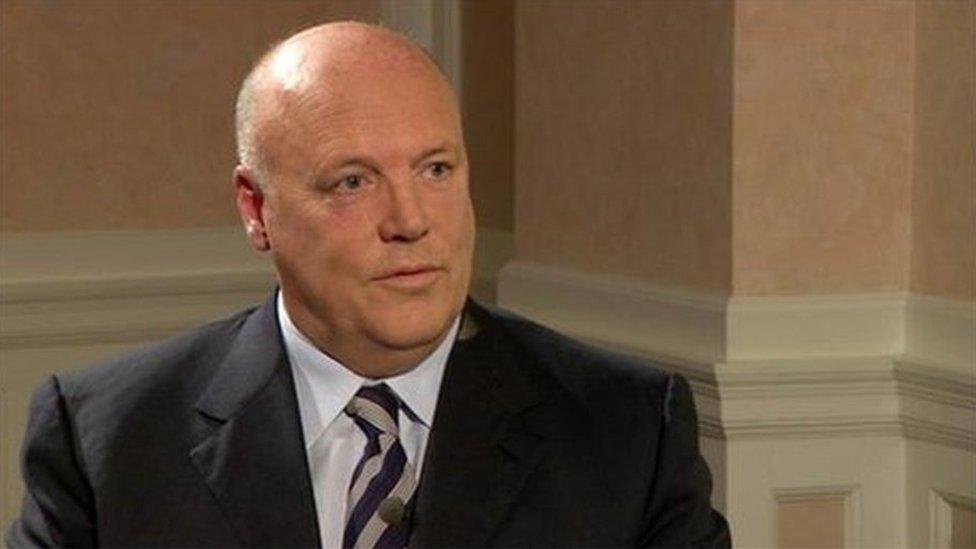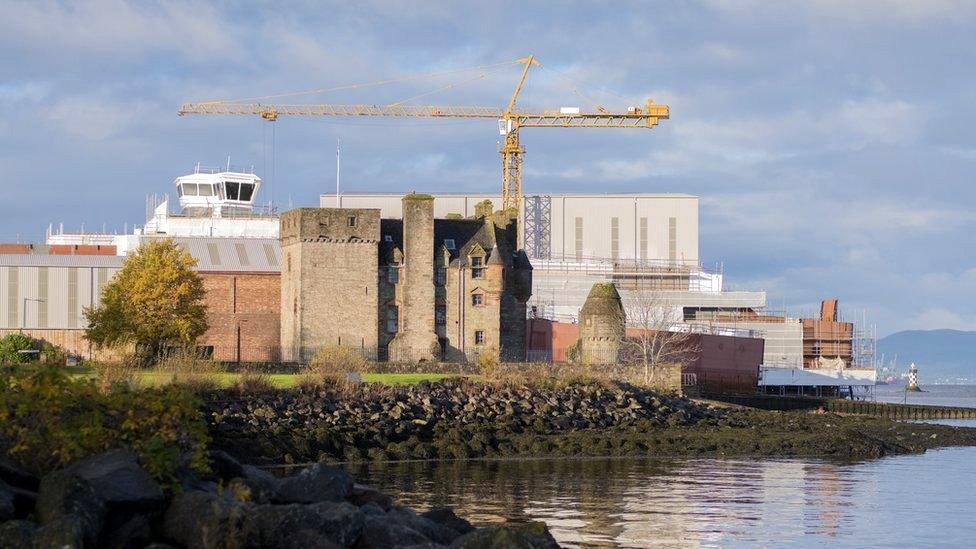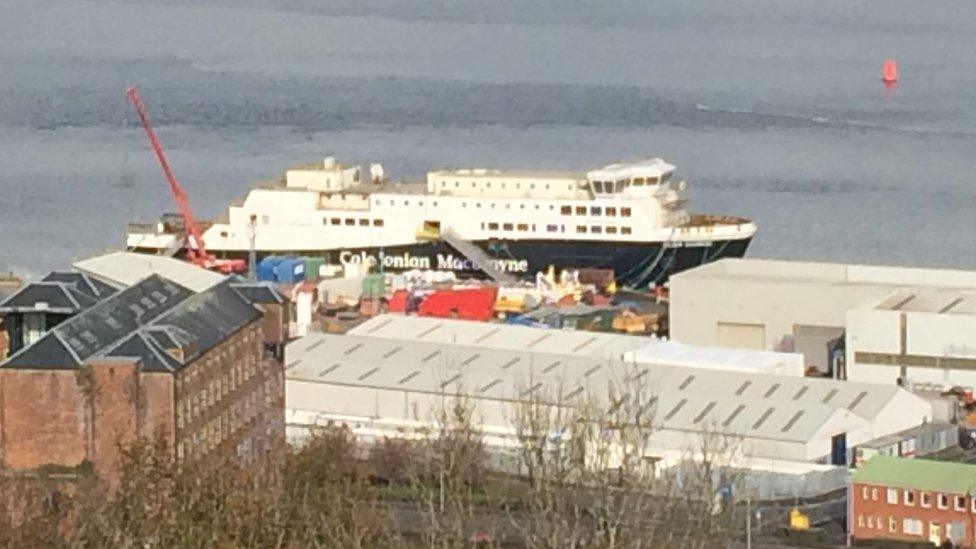Jim McColl: CalMac ferries 'should be scrapped'
- Published
- comments

The Glen Sannox is one of two ferries being built to serve CalMac routes
Two CalMac ferries at the centre of a political storm over cost and delays should be scrapped and work started again, it has been claimed.
Industrialist Jim McColl has spoken out against the Scottish government's plan to spend at least £110m on the part-finished ferries.
He was in charge of the shipyard where the ferries were being built before it collapsed and was nationalised.
Management of the yard has been sharply criticised in a new government report, external.
The ferries were being constructed at Ferguson shipyard in Inverclyde to replace old ferries on Clyde and Hebridean routes operated by CalMac.
They are more than a year overdue.
In an exclusive interview with BBC Scotland, the former chairman of Ferguson Marine Engineering said he was taking legal advice on whether the Scottish government's attack on his management was defamatory.
He said the report into the ferry fiasco, drawn up for the government after it took ownership of the yard, was "outrageous" and a "snow job" to cover up the role of the government agency involved in procuring the ferries.
Mr McColl said Caledonian Maritime Assets Limited, which required numerous design changes, was the key reason why the budget and timetable went out of control.

Jim McColl is taking legal advice on the Scottish government's report
The ship design uses a novel hybrid power system, using marine diesel for getting in and out of ports, and liquefied natural gas while at sea. The need for new safety certificates also caused delays.
Mr McColl challenged the Scottish government's plan to continue building the two ships, after months of neglect. One has been moored at the quayside and the other sits on the slipway at the Port Glasgow yard.
That would effectively write off more than £80m already spent on them, while more than £45m in loans from the Scottish government have been written off.
The businessman said some materials could be used in new hulls, but that it would be better value for taxpayer money to start building again, to a simpler design. He suggested three smaller ferries could be built for the same original £97m budget.
'Remedial work'
The report published this week was strongly critical of the management of Ferguson Marine while Mr McColl was chairman, saying it lacked project and financial controls.
Internal controls were reported as poor or non-existent. It said that there had been a "major departure from the specification" and as a result of defects, most of the pipe work would have to be removed from the engine rooms.
The attack on Mr McColl's competence is despite his success in running engineering companies around the world. He gets closely involved in management and is reckoned to be a billionaire. His advice was sought by the Scottish government as a member of its Council of Economic Advisers.
The report went on to estimate a £13m bill for remedial work on the hulls taking seven months, including removal of rust and a dry dock inspection of the first ferry's hull. There would then be a £95m bill to complete the vessels.

Ferguson Marine in Inverclyde was nationalised by the Scottish government in August
Whereas the ships were due to be delivered in summer 2018, the first one, the Glen Sannox, is now scheduled for delivery by December 2021 and the second, known as Vessel 802, by October 2022. But that is with only an 80% probability.
There is, in addition, a warning of "significant challenges" to get the yard working effectively, to improve productivity, recruiting the right people and it flags up a problem in "controlling and managing" the sub-contracted design firm.
Mr McColl, who accurately predicted the doubling in cost, said: "It'll become more than that and the vessels will take longer than they're saying.
"You'd be better building from scratch and to a design that's more suited to what's needed. They could probably build three smaller vessels for less than £100m and it would give them more flexibility."
Facing criticisms for his own management, Mr McColl drew attention to the reports commissioned by Scottish ministers from an expert adviser over the past two years, which he says were "damning" of the role of the government-owned procuring company, CMAL.
'Inquiry needed'

Luke van Beek was appointed by economy secretary Derek Mackay to report back on the state of the project, with advice on whether government loans should be released.
In a private report to ministers released under Freedom of Information law in October, Mr van Beek said that the breakdown of relations between the client and the shipbuilder should be addressed through mediation, and he advised against nationalisation of the yard.
Mr McColl said the minister was "trying to put people off the scent". Criticism of his management team was "outrageous and unacceptable - the team selected were some of the best in the UK, and head and shoulders above those in there now. I've asked if we can sue them for defamation of character".
He added: "There needs to be an inquiry. The way they've handled this is incompetent".
Ferry procurement inquiry
The Holyrood committee for the rural economy and connectivity is to carry out an inquiry into ferry procurement, looking into the contract that has gone so badly wrong and at the implications for future ferry services.
The committee convener, Conservative MSP Edward Mountain, said the aim would be to avoid mistakes being made with future orders.
He said: "These developments clearly have important implications, not only for the completion of the two vessels but also for future plans for the replacement and refurbishment of vessels to meet the ongoing needs of the Clyde and Hebrides ferries network more generally.
"The committee wants to find out not only what has gone wrong and how things will be put right but how these problems can be avoided in the future."
"We need to make sure that the relevant lessons from this saga are learned for the procurement and construction of new ferries in future."
A Scottish government spokesman said: "Our efforts saved Ferguson Marine from closure, saving over 300 jobs, ensured that the two vessels under construction will be completed, and secured a future for the yard.
"Scottish ministers are committed to transparency on these issues. We have kept parliament informed of progress and have proactively published information on our website.
"We welcome the opportunity to respond to any additional inquiries that the committee might wish to raise."
- Published18 December 2019

- Published2 December 2019
